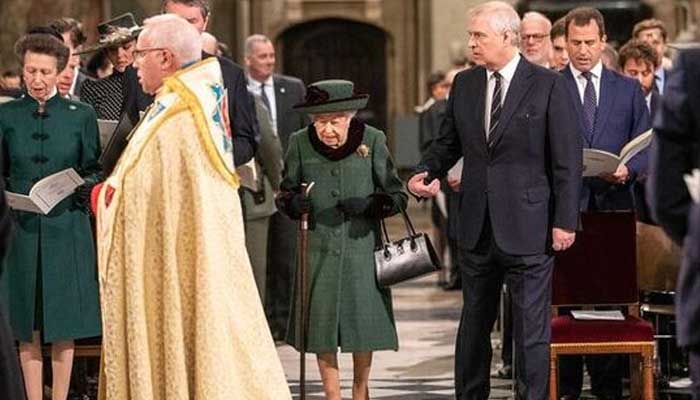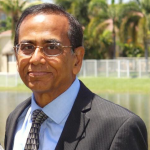
This was Prince Andrew’s father’s memorial service. Shamed or not, of course he had to be there.
Nazarul Islam
Of late, the Queen of England must have grasped that her preference for Prince Andrew to accompany her down the aisle at Westminster Abbey would bring her little but condemnation. “Still a sweaty nonce” was one such response on Twitter, charmingly expressing what many might nonetheless feel: that such is the nature of Andrew’s extensive failures as a human being, he should have been locked away in a royal basement, not paraded before the country.
I am sure the Queen had understood what she was doing. She did it….anyway, because though few people have any doubt that the Prince is a total wrong’ (No one would doubt it one bit), he is still ‘family’. It is not unusual for families to have rotters in their midst. And one of the most valuable things about a family is that ‘virtue is not a condition of membership’.
A mother can love her children, even if they have done terrible things — indeed, that is precisely the sort of dogged love many Brits celebrated last Sunday. Besides, this was Prince Andrew’s father’s memorial service. Shamed or not, of course he had to be there. (Though, over in sunny California, the more virtuous members of the Royal family didn’t quite see it that way.)
In truth, not many people care for memorial services. The purpose of these gatherings is to speak well of the dead; literally, to eulogize. Such events work well for the powerful, the famous and the righteous. “A man of rare ability and distinction, rightly honored and celebrated, he ever directed our attention away from himself,” said the Dean of Westminster, of late Prince Phillip.
Memorial services don’t require much religion either, which is part of their popularity in a secular age. They are sandwiches of hymns and readings and speeches — and songs can be easily substituted for hymns, poems for Bible passages.
A priest whom I knew from my teaching days at Market Harborough north of London, had buried a number of men (always men, as it happens) about whom no one had a good word to say. He had recalled having buried Pedophiles. He had also buried murderers. No one wanted to come to their service. The funeral had been just him, an empty crematorium, and their coffin. The weakness of the memorial service is that it doesn’t work in such circumstances.
Obviously, there is no eulogy to be had here because there are no good words. Memorial services exist only for upstanding members of the community.
But alone in the crematorium, undertakers who just had a fag outside, and armed only with the words of the Mass, there had exists a kind of encounter with death, and with the evil that some people do, that for me at least is the absolute core of priestly ministry. Of course, most of us did committed such crimes — but nonetheless, this still feels like the business end of the human condition.
And do…This is death as total desolation, without applause, without consolation. And of course, I pray for forgiveness, no matter what the crime. And for the victims of this person’s wickedness too. Which is why I often cannot myself forgive — that stuff is seriously above my so called ‘status’. No, I will leave that bit to God.
There wasn’t a prayer of confession at last week’s memorial service for the deceased husband of Queen Elizabeth, Prince Philip. Many would have loved to see Andrew perspire his way through that one. “We have done evil in your sight,” said a congregation together on Mothering Sunday. Some among us have more to confess than others. But confession and the search for redemption has existed for those who have done great wrong as well as for those of us seeking reassurance as to the eternal consequences of our daily peccadillos.
“Amazing grace, how sweet the sound, that saved a wretch like me.” I happen know a church in South London has long been a black-majority church. Yet one of the most popular hymns the flock sang, is one written by a former slave trader, John Newton. Had the memorial to him been in stone, no doubt the churchgoers would have been asked to take it down. Then, there is the example created by the Jesus College Cambridge, which has been petitioning — unsuccessfully, as this turned out it now turns out — to have a memorial to a college benefactor, Tobias Rustat. His statue was taken down because of his links to the slave trade.
Some months ago, the Archbishop of Canterbury unwisely had got involved, supporting its removal.
One should not have problem with removing bits of old stone in churches and chapels. But I do find it problematic that we might do so on the basis of the virtue of those being memorialized. Please remember that the church is not a house of moral virtue but a place for those seeking redemption — and that means a place for the wicked as well as for the just. “I once was lost and now am found,” wrote Newton.
Today, I will absolutely not argue that we ought to see the good in people who have done great wrong, that somehow, deep down, they have within them a spark of goodness. Nor am I naive about the possibility of change. Priests are generally much more skeptical of human nature than many people expect. We have listened to so much self-justifying bull* I want to go over the years — how could we not be?
No, this is not about thinking people are better than they are. It is about God’s capacity to forgive in a way which exceeds my own.
The possibility of forgiveness is awkwardly related to morality. Secular versions of evil generally invite a kind of retributive logic in which wickedness deserves punishment. Forgiveness sticks in the craw of moral reasoning. Which is why, without God, morality inevitably becomes a kind of cancel culture — a righteous anger that responds to injustice with punishment.
And such a culture will have no truck with what might look like attempts to rehabilitate wrongdoers — sweaty nonce, whether princes or not.
However….fundamentally, Christianity isn’t perhaps much interested in morality, as it’s interested in love. At its core, it’s about how to love the intrinsically unlovable. As a mother might love her unlovable child. As God might love us. Allowing Andrew to support her as she walked into the place where she made vows to support the Christian faith might just be one of the most obviously religious things the Queen has done.
And when Christianity gets enacted at this level, we should expect to be scorned for it, not applauded. Mother Teresa has created good examples for us to cheer about.
________________
 The Bengal-born writer Nazarul Islam is a senior educationist based in USA. He writes for Sindh Courier and the newspapers of Bangladesh, India and America. He is author of a recently published book ‘Chasing Hope’ – a compilation of his articles.
The Bengal-born writer Nazarul Islam is a senior educationist based in USA. He writes for Sindh Courier and the newspapers of Bangladesh, India and America. He is author of a recently published book ‘Chasing Hope’ – a compilation of his articles.